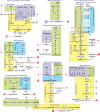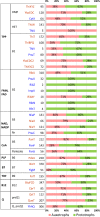Micronutrient Requirements and Sharing Capabilities of the Human Gut Microbiome
- PMID: 31275260
- PMCID: PMC6593275
- DOI: 10.3389/fmicb.2019.01316
Micronutrient Requirements and Sharing Capabilities of the Human Gut Microbiome
Abstract
The human gut microbiome harbors a diverse array of metabolic pathways contributing to its development and homeostasis via a complex web of diet-dependent metabolic interactions within the microbial community and host. Genomics-based reconstruction and predictive modeling of these interactions would provide a framework for diagnostics and treatment of dysbiosis-related syndromes via rational selection of therapeutic prebiotics and dietary nutrients. Of particular interest are micronutrients, such as B-group vitamins, precursors of indispensable metabolic cofactors, that are produced de novo by some gut bacteria (prototrophs) but must be provided exogenously in the diet for many other bacterial species (auxotrophs) as well as for the mammalian host. Cross-feeding of B vitamins between prototrophic and auxotrophic species is expected to strongly contribute to the homeostasis of microbial communities in the distal gut given the efficient absorption of dietary vitamins in the upper gastrointestinal tract. To confidently estimate the balance of microbiome micronutrient biosynthetic capabilities and requirements using available genomic data, we have performed a subsystems-based reconstruction of biogenesis, salvage and uptake for eight B vitamins (B1, B2, B3, B5, B6, B7, B9, and B12) and queuosine (essential factor in tRNA modification) over a reference set of 2,228 bacterial genomes representing 690 cultured species of the human gastrointestinal microbiota. This allowed us to classify the studied organisms with respect to their pathway variants and infer their prototrophic vs. auxotrophic phenotypes. In addition to canonical vitamin pathways, several conserved partial pathways were identified pointing to alternative routes of syntrophic metabolism and expanding a microbial vitamin "menu" by several pathway intermediates (vitamers) such as thiazole, quinolinate, dethiobiotin, pantoate. A cross-species comparison was applied to assess the extent of conservation of vitamin phenotypes at distinct taxonomic levels (from strains to families). The obtained reference collection combined with 16S rRNA gene-based phylogenetic profiles was used to deduce phenotype profiles of the human gut microbiota across in two large cohorts. This analysis provided the first estimate of B-vitamin requirements, production and sharing capabilities in the human gut microbiome establishing predictive phenotype profiling as a new approach to classification of microbiome samples. Future expansion of our reference genomic collection of metabolic phenotypes will allow further improvement in coverage and accuracy of predictive phenotype profiling of the human microbiome.
Keywords: 16S; comparative genomics; gut microbiome; metagenomics; vitamin metabolism.
Figures







Similar articles
-
B-Vitamin Sharing Promotes Stability of Gut Microbial Communities.Front Microbiol. 2019 Jul 2;10:1485. doi: 10.3389/fmicb.2019.01485. eCollection 2019. Front Microbiol. 2019. PMID: 31333610 Free PMC article.
-
Genomics-Based Reconstruction and Predictive Profiling of Amino Acid Biosynthesis in the Human Gut Microbiome.Microorganisms. 2022 Mar 30;10(4):740. doi: 10.3390/microorganisms10040740. Microorganisms. 2022. PMID: 35456791 Free PMC article.
-
Unveiling of dietary and gut-microbiota derived B vitamins: Metabolism patterns and their synergistic functions in gut-brain homeostasis.Crit Rev Food Sci Nutr. 2024;64(13):4046-4058. doi: 10.1080/10408398.2022.2138263. Epub 2022 Oct 22. Crit Rev Food Sci Nutr. 2024. PMID: 36271691 Review.
-
High throughput genome scale modeling predicts microbial vitamin requirements contribute to gut microbiome community structure.Gut Microbes. 2022 Jan-Dec;14(1):2118831. doi: 10.1080/19490976.2022.2118831. Gut Microbes. 2022. PMID: 36081364 Free PMC article.
-
Vitamins, the gut microbiome and gastrointestinal health in humans.Nutr Res. 2021 Nov;95:35-53. doi: 10.1016/j.nutres.2021.09.001. Epub 2021 Oct 21. Nutr Res. 2021. PMID: 34798467 Review.
Cited by
-
Design and reporting of prebiotic and probiotic clinical trials in the context of diet and the gut microbiome.Nat Microbiol. 2024 Nov;9(11):2785-2794. doi: 10.1038/s41564-024-01831-6. Epub 2024 Oct 30. Nat Microbiol. 2024. PMID: 39478082 Review.
-
Direct Cobamide Remodeling via Additional Function of Cobamide Biosynthesis Protein CobS from Vibrio cholerae.J Bacteriol. 2021 Jul 8;203(15):e0017221. doi: 10.1128/JB.00172-21. Epub 2021 Jul 8. J Bacteriol. 2021. PMID: 34031037 Free PMC article.
-
Shift of Choline/Betaine Pathway in Recombinant Pseudomonas for Cobalamin Biosynthesis and Abiotic Stress Protection.Int J Mol Sci. 2022 Nov 11;23(22):13934. doi: 10.3390/ijms232213934. Int J Mol Sci. 2022. PMID: 36430408 Free PMC article.
-
Flexible Cobamide Metabolism in Clostridioides (Clostridium) difficile 630 Δerm.J Bacteriol. 2020 Jan 2;202(2):e00584-19. doi: 10.1128/JB.00584-19. Print 2020 Jan 2. J Bacteriol. 2020. PMID: 31685533 Free PMC article.
-
Postbiotics and Their Potential Applications in Early Life Nutrition and Beyond.Int J Mol Sci. 2019 Sep 20;20(19):4673. doi: 10.3390/ijms20194673. Int J Mol Sci. 2019. PMID: 31547172 Free PMC article. Review.
References
Grants and funding
LinkOut - more resources
Full Text Sources
Other Literature Sources
Molecular Biology Databases

